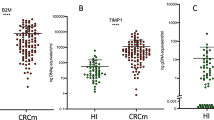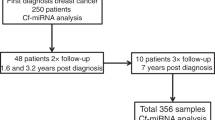Abstract
Molecular marker analyses aiming a more accurate disease characterization and risk stratification of cancer patients provided several promising marker candidates in the last few years. However, recent reviews underlined the paramount importance of validation, since many of the initially promising results could not be confirmed in independent patient cohorts. If serum or plasma is a more appropriate sample to test for prognostic markers is a matter of debate. We recently found serum MMP-7 levels to correlate with poor patients’ prognosis in urinary bladder cancer. In this study, we examined associations of the MMP-7 plasma levels with clinical follow-up data in an independent cohort of bladder cancer patients to validate our former results and to assess if plasma is also suitable for MMP-7 analysis. Plasma levels of 97 patients and 22 controls were analyzed, using enzyme-linked immunosorbent assay. Associations between MMP-7 plasma concentrations and clinical data were assessed applying both univariate and multivariate analysis. Plasma MMP-7 levels were significantly higher in patients than in controls. Similarly to our former findings in sera, high MMP-7 plasma levels proved to be significant and independent predictors of both overall and disease-specific survival. In addition, we observed a metastasis-specific difference in MMP-7 levels between serum and plasma. In summary, we confirmed the prognostic relevance of circulating MMP-7 levels in an independent cohort of patients and concluded that circulating MMP-7 levels may help to identify bladder cancer patients at high-risk of disease progression who could benefit from an adjuvant chemotherapy or from an extended lymph node dissection.



Similar content being viewed by others
References
Madersbacher S, Hochreiter W, Burkhard F, Thalmann GN, Danuser H, Markwalder R, Studer UE (2003) Radical cystectomy for bladder cancer today—a homogeneous series without neoadjuvant therapy. J Clin Oncol 21:690–696
Hautmann RE, Gschwend JE, de Petriconi RC, Kron M, Volkmer BG (2006) Cystectomy for transitional cell carcinoma of the bladder: results of a surgery only series in the neobladder era. J Urol 176:486–492
vom Dorp F, Börgermann C, Schenck M, Becker M, Rose A, Szarvas T, Rübben H (2009) Role of lymphadenectomy in patients with invasive urothelial carcinoma of the bladder. Urologe 48:51–53
Dyrskjøt L, Zieger K, Real FX, Malats N, Carrato A, Hurst C, Kotwal S, Knowles M, Malmström PU, de la Torre M, Wester K, Allory Y, Vordos D, CaillaultA RF, Hein AM, Jensen JL, Jensen KM, Marcussen N, Orntoft TF (2007) Gene expression signatures predict outcome in non-muscle-invasive bladder carcinoma: a multicenter validation study. Clin Cancer Res 13:3545–3551
Szarvas T, Becker M, vom Dorp F, Gethmann C, Tötsch M, Bánkfalvi A, Schmid KW, Romics I, Rübben H, Ergün S (2010) Matrix metalloproteinase-7 as a marker of metastasis and predictor of poor survival in bladder cancer. Cancer Sci 101:1300–1308
Riley RD, Sauerbrei W, Altman DG (2009) Prognostic markers in cancer: the evolution of evidence from single studies to meta-analysis, and beyond. Br J Cancer 100:1219–1229
Altman DG, Royston P (2000) What do we mean by validating a prognostic model? Stat Med 19:453–473
Bleeker SE, Moll HA, Steyerberg EW, Donders AR, Derksen-Lubsen G, Grobbee DE, Moons KG (2003) External validation is necessary in prediction research: a clinical example. J Clin Epidemiol 56:826–832
Werther K, Christensen IJ, Nielsen HJ, Danish RANX05 Colorectal Cancer Study Group (2002) Prognostic impact of matched preoperative plasma and serum VEGF in patients with primary colorectal carcinoma. Br J Cancer 86:417–423
Eble JN, Epstein JI, Sesterhenn I (2004) World Health Organization classification of tumors. Pathology and genetics of tumors of the urinary system and male genital organs. IARCC Press, Lyon, pp 89–158
Jung K, Klotzek S, Stephan C, Mannello F, Lein M (2008) Impact of blood sampling on the circulating matrix metalloproteinases 1, 2, 3, 7, 8, and 9. Clin Chem 54:772–773
Powell WC, Fingleton B, Wilson CL, Boothby M, Matrisian LM (1999) The metalloproteinase matrilysin proteolytically generates active soluble Fas ligand and potentiates epithelial cell apoptosis. Curr Biol 9:1441–1447
Noë V, Fingleton B, Jacobs K, Crawford HC, Vermeulen S, Steelant W, Bruyneel E, Matrisian LM, Mareel M (2001) Release of an invasion promoter E-cadherin fragment by matrilysin and stromelysin-1. J Cell Sci 114:111–118
Ito TK, Ishii G, Saito S, Yano K, Hoshino A, Suzuki T, Ochiai A (2009) Degradation of soluble VEGF receptor-1 by MMP-7 allows VEGF access to endothelial cells. Blood 113:2363–2369
Cornelius LA, Nehring LC, Harding E, Bolanowski M, Welgus HG, Kobayashi DK, Pierce RA, Shapiro SD (1998) Matrix metalloproteinases generate angiostatin: effects on neovascularization. J Immunol 161:6845–6852
Wang WS, Chen PM, Wang HS, Liang WY, Su Y (2006) Matrix metalloproteinase-7 increases resistance to Fas-mediated apoptosis and is a poor prognostic factor of patients with colorectal carcinoma. Carcinogenesis 27:1113–1120
Koskensalo S, Mrena J, Wiksten JP, Nordling S, Kokkola A, Hagström J, Haglund C (2010) MMP-7 overexpression is an independent prognostic marker in gastric cancer. Tumour Biol 31:149–155
Yamamoto H, Itoh F, Iku S, Adachi Y, Fukushima H, Sasaki S, Mukaiya M, Hirata K, Imai K (2001) Expression of matrix metalloproteinases and tissue inhibitors of metalloproteinases in human pancreatic adenocarcinomas: clinicopathologic and prognostic significance of matrilysin expression. J Clin Oncol 19:1118–1127
Pajouh MS, Nagle RB, Breathnach R, Finch JS, Brawer MK, Bowden GT (1991) Expression of metalloproteinase genes in human prostate cancer. J Cancer Res Clin Oncol 117:144–150
Maurel J, Nadal C, Garcia-Albeniz X, Gallego R, Carcereny E, Almendro V, Mármol M, Gallardo E, Augé JM, Longarón R, Martínez-Fernandez A, Molina R, Castells A, Gascón P (2007) (2007) Serum matrix metalloproteinase 7 levels identifies poor prognosis advanced colorectal cancer patients. Int J Cancer 121:1066–1071
Martínez-Fernandez A, García-Albeniz X, Pineda E, Visa L, Gallego R, Codony-Servat J, Augé JM, Longarón R, Gascón P, Lacy A, Castells A, Maurel J (2009) Serum matrilysin levels predict outcome in curatively resected colorectal cancer patients. Ann Surg Oncol 16:1412–1420
Ramankulov A, Lein M, Johannsen M, Schrader M, Miller K, Jung K (2008) Plasma matrix metalloproteinase-7 as a metastatic marker and survival predictor in patients with renal cell carcinomas. Cancer Sci 99:1188–1194
Szarvas T, Becker M, vom Dorp F, Meschede J, Scherag A, Bánkfalvi A, Henning R, Schmid KW, Romics I, Rübben H, Ergün S (2010) Elevated serum matrix metalloproteinase 7 levels predict poor prognosis after radical prostatectomy Int J Cancer (In press)
Szarvas T, Singer BB, Becker M, vom Dorp F, Jäger T, Szendrői A, Riesz P, Romics I, Rübben H, Ergün S (2010) Urinary MMP-7 level is associated with the presence of metastasis in bladder cancer. BJU Int (In press)
Acknowledgement
We thank Ms. Stephanie Abraham for excellent technical assistance. We are grateful for the financial assistance of the National Federal Ministry of Education and Research (Project 0313659B).
Conflict of Interests Statement
None of the authors of this manuscript have a conflict of interest to declare.
Author information
Authors and Affiliations
Corresponding author
Rights and permissions
About this article
Cite this article
Szarvas, T., Jäger, T., Becker, M. et al. Validation of Circulating MMP-7 Level as an Independent Prognostic Marker of Poor Survival in Urinary Bladder Cancer. Pathol. Oncol. Res. 17, 325–332 (2011). https://doi.org/10.1007/s12253-010-9320-4
Received:
Accepted:
Published:
Issue Date:
DOI: https://doi.org/10.1007/s12253-010-9320-4




